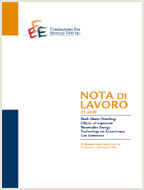Policies and Practices of Low Carbon City Development in China

27.01.2014
Can Wang, Jie Lin, Wenjia Cai, ZhongXiang Zhang
Q42, Q43, Q48, Q54, Q55, Q56, Q58, O13, O53, R52, R58
Policies, Practices, Low carbon city, Market-based instruments, Energy, Governments, China
Climate Change and Sustainable Development
Carlo Carraro
Globally as well as in China, cities have contributed to most of the economic output and have accordingly given rise to most CO2 emissions. In particular, given unprecedented urbanization, cities will play an even greater role in shaping energy demand and CO2 emissions. Therefore, cities are the key to meeting its proposed carbon intensity target in 2020 and whatever climate commitments beyond 2020 that China may take. Given the paramount importance of cities, China is practicing low carbon city (LCC) development. Against this background, this paper first summarizes the general situation and main characteristics of China’s LCC development. The paper then identifies eight problems and challenges for China’s LCC development including the absence of sound carbon accounting systems, lack of low-carbon specific evaluation system, rare use of market-based instruments, insufficient government-enterprise interactions, excessive budget dependence on land concession, increasing difficulty in further carbon mitigation, inevitable emissions growth due to rising living standards, and coal-dominant energy structure in the foreseeable future. Since these challenges are not applied to one or few cities, but are to all cities across the country, finally, the paper discusses how governments, in particular the central government, should address these problems and challenges. Given that China has faced great difficulty ensuring that local governments act in accordance with centrally-directed policies, the paper in particular discusses ways to incentivize local governments not to focus on economic growth alone and to move away from a heavy reliance on land concession. The paper ends with emphasizing on putting a price on carbon a crucial step for China’s endeavor of harnessing the market forces to reduce its energy consumption and carbon emissions and genuinely transiting into a low-carbon economy.
***
Suggested citation: Wang, C., J. Lin, W. Cai, Z. Zhang, (2014), ‘Policies and Practices of Low Carbon City Development in China’, Nota di Lavoro 9.2014, Milan, Italy: Fondazione Eni Enrico Mattei.
